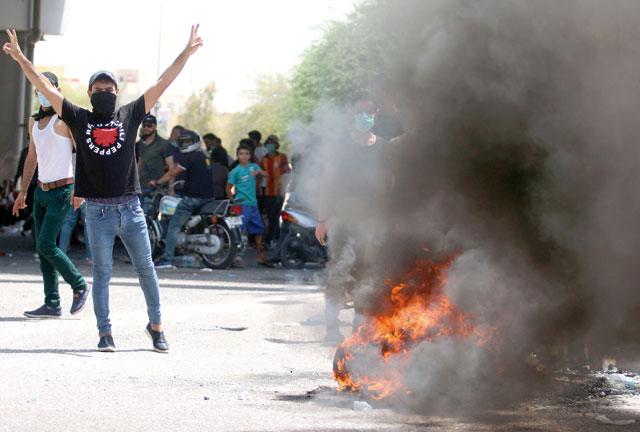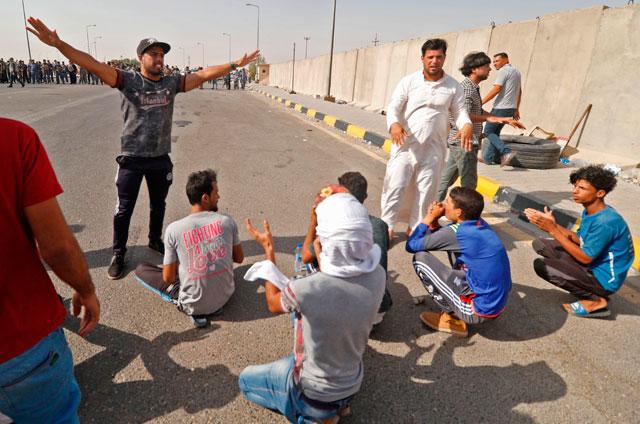You are here
Iraqi police fire in air as protesters try to storm Basra gov’t building
By Reuters - Jul 15,2018 - Last updated at Jul 15,2018

An Iraqi protester gestures near a burning tyre during a demonstration in Basra on Sunday (AFP photo)
BASRA, Iraq — Iraqi police fired in the air to disperse hundreds of protesters who tried to storm a government building in Basra and demonstrated near an oil field, police said, wounding 48 people in unrest over poor services that has swept southern cities.
"Some protesters tried to break into the building, but we prevented them. We ask protesters to avoid facing off with security forces," said Major General Thamir Al Hussaini, commander of the interior ministry's Rapid Response Forces.
He said a total of 28 members of the security forces were wounded in clashes with demonstrators.
Similar protests have occurred in the past in Basra, but the latest unrest comes at a politically sensitive time.
The week of protests has put Iraqi Prime Minister Haider Al Abadi in a difficult position. He hopes to serve a second term when politicians form a new government following a May 12 parliamentary election tainted by allegations of fraud.
Protesters lambasted his Dawa Party, which has dominated Iraqi politics since a 2003 US-led invasion toppled Saddam Hussein.
"The Dawa Party has been running Iraq for 15 years and its leaders failed to live up to even a single promise they made," said Ziad Fadhil, 38, who is unemployed. He held up a piece of cardboard to shield his head from the scorching sun.
Eight protesters were wounded at the provincial government building in the oil hub city of Basra in the south, police said.
Security forces also faced demonstrations about four kilometres from Eni's Zubair oil field near Basra. Forty protesters were wounded, three by live fire, according to police sources.
In a town near the southern city of Amara, police opened fire into the air to disperse protesters after demonstrators set fire to the municipality building. Thirteen protesters and seven policemen were wounded in the clashes.
Iraq's top Shiite cleric, Grand Ayatollah Ali Al Sistani, has expressed solidarity with protesters, saying they faced an "extreme lack of public services".
Sistani, who has millions of followers, rarely intervenes in politics, but has wide sway over public opinion.
Internet access in Iraq has been dramatically reduced.
Local officials said demonstrations have not affected crude production in Basra, whose shipments account for more than 95 per cent of OPEC producer Iraq's state revenues.
Any disruption could severely impact the country's limping economy and push up global oil prices.
Struggle to re-build
On Friday, protesters stormed the international airport in the holy city of Najaf, temporarily suspending air traffic.
Jordan's state airline said on Sunday it had suspended four weekly flights to the Iraqi city of Najaf due to the "security situation at its airport, a company statement said. Flyudubai also followed suit.
Flights from Iran to the Iraqi city of Najaf will be diverted to Baghdad, Iran's state television reported on Sunday.
Abadi has announced that his caretaker government would release funds to Basra for water, electricity and health services.
A political bloc led by populist cleric Moqtada Al Sadr won a majority in the poll on an anti-corruption platform which had appeal across Iraq's electorate.
Substantial relief is unlikely to come anytime soon for Basra, once dubbed the "Venice of the Middle East" for its network of canals resembling the Italian city.
Iraq needs to generate billions of dollars to rebuild after its three-year war with Daesh.
Demonstrators, who are demanding jobs and better government services, have cut off access to the southern Umm Qasr commodities port.
Security forces have battled protesters in Basra and several other cities in the south.
Saddam Hussein oppressed the country's majority Shiites, neglecting their southern heartland.
Successive Shiite-led governments that have run the country since he was toppled in 2003 have also done little to improve lives in Basra and others cities in the region, where oil money rarely trickles down to the population.
"Since the fall of Saddam in 2003 and until now the only real thing Shiite politicians have been saying is their lies," said Usama Abbas, 25, an unemployed college graduate.
"We still drink filthy water and forgot what air conditioning means during summer."
The demonstrators have taken the unusual step of attacking buildings belonging to powerful Shiite militias, in addition to local government headquarters.
Abadi, who also serves as commander-in-chief of Iraq's armed forces, had earlier issued a nationwide order placing security forces on high alert in the southern provinces.
His directive aims to stem the burgeoning protests, which spread from Basra to the cities of Amara, Nasiriya and the Shiite holy city of Najaf.
Related Articles
BASRA, Iraq — Iraqi police wielded batons and rubber hoses to disperse about 250 protesters gathered at the main entrance to the Zubai
BAGHDAD — Iraq placed its security forces on high alert on Saturday, in response to ongoing protests in the country’s southern provinces ove
BASRA, Iraq — Iraqi police opened fire to disperse dozens of protesters near the southern oil hub of Basra on Sunday as they demonstrated ag


















